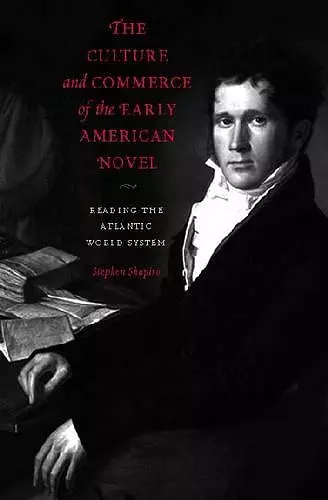The Culture and Commerce of the Early American Novel
Reading the Atlantic World-System
Format:Hardback
Publisher:Pennsylvania State University Press
Published:11th Apr '08
Currently unavailable, and unfortunately no date known when it will be back
This hardback is available in another edition too:
- Paperback£32.99(9780271032917)

The Culture and Commerce of the Early American Novel charts the advent, decline, and reinvigoration of the early American novel.
Charts the advent, decline, and reinvigoration of the early American novel. This book refines the conceptual frameworks for analyzing cultural and social history, such as the rise in sentimentalism, in relation to a long-wave economic history of global commerce. It fosters a model for a comparative American Studies across time.
Taking his cue from Philadelphia-born novelist Charles Brockden Brown’s Annals of Europe and America, which contends that America is shaped most noticeably by the international struggle between Great Britain and France for control of the world trade market, Stephen Shapiro charts the advent, decline, and reinvigoration of the early American novel. That the American novel “sprang so unexpectedly into published existence during the 1790s” may be a reflection of the beginning of the end of Franco-British supremacy and of the power of a middle class riding the crest of a new world economic system.
Shapiro’s world-systems approach is a relatively new methodology for literary studies, but it brings two particularly useful features to the table. First, it refines the conceptual frameworks for analyzing cultural and social history, such as the rise in sentimentalism, in relation to a long-wave economic history of global commerce; second, it fosters a new model for a comparative American studies across time. Rather than relying on contiguous time, a world-systems approach might compare the cultural production of one region to another at the same location within the recurring cycle in an economic reconfiguration. Shapiro offers a way of thinking about the causes for the emergence of the American novel that suggests a fresh approach to the paradigms shaping American studies.
“Shapiro offers a powerfully synthesized reexamination of the early American novel.”
—A. T. Hale Choice
“Shapiro develops a stunning reconceptualization of the 1790s based on America’s position in Atlantic history at the end of the eighteenth century and an equally impressive analysis of what this reconceptualization means for our understanding of early American literature and culture.”
—Michelle Burnham Eighteenth-Century Studies
“As scholars such as Franco Moretti and Rodrigo Lazo encourage us to identify and expand the vast uncharted archives of novels that would necessarily alter our theories of the genre, Shapiro’s analysis reminds us that sometimes, just a few novels will do. His study paves the way, particularly for critics of sentimental, seduction, and popular fiction of the late eighteenth century, toward far richer accounts of how fictional forms function in the interstices between the early U.S. nation-state and the geo-economic, cultural, and political conditions of the American hemispheric context.”
—Gretchen J. Woertendyke Huntington Library Quarterly
“Shapiro’s [work] squarely and massively dissects market ideology. . . . [It] is what Harold Bloom would call a strong reading, with all the risks and benefits that boldness implies. . . . Shapiro reduces the era’s economic influences to an alliterative quartet—sensibility, sensational consumption, slavery, and sentiment. Although these terms have long been associated with eighteenth-century culture, their combination in a kind of social compound—a geoculture—is particularly powerful here. . . . Culture and Commerce is a massive, often brilliant, utterly original synthesis exposing important elements of the period’s structure of feeling.”
—Joseph Fichtelberg Early American Literature
“Culture and Commerce is a massive, often brilliant, utterly original synthesis exposing important elements of the period’s structure of feeling.”
—Joseph Fichtelberg Early American Literature
“Shapiro’s theory of the early American novel—grounded in the cultural realities of the historical moment and informed by an economic theory that thinks beyond the nation-state—is compelling.
”
—Betsy Klimasmith Eighteenth Century Fiction
“In The Culture and Commerce of the Early American Novel: Reading the Atlantic World-System, Stephen Shapiro provides a compelling account of the emergence of the American novel as a cultural form deeply implicated within the global economic transitions of the 1790s. While the novel in the new United States is the ostensible focus of this book, Shapiro skillfully moves through an account of the economic, social, and intellectual worlds of the late eighteenth century to situate the cultural work of this literary form.”
—Adam C. Lewis Resources for American Literary Study
ISBN: 9780271032900
Dimensions: 229mm x 152mm x 33mm
Weight: 680g
384 pages